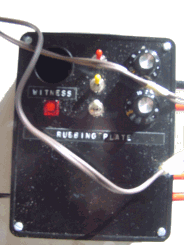Other Timelines, other rules
With all the problems in the Middle East you might wish you live on another timeline, one where the US never had slaves, there was no WWI or WWII or atomics. One with low crime.
Well, as many of you know, there are other timelines where George Washington freed all his slaves, made slavery illegal, and fought for the right of women to vote. His ideas, which seemed progressive at the time, lead the Federalist party to effectively control congress for many years.
On that timeline, There were three political parties {the Federalist party, close to our reagan republican party of limited government, the constitutionalist party similar to our libertarian party, and the labor party similar to the liberal democrats}.
All went well for the Federalists, until the 1950's when they tried to pass some laws.
First they wanted a speed limit on roads to decrease fatalities on the motorways, and they also wanted a limit on blood alcohol.
The constitutionalists said that infringed on the "Freedom of Movement" right and spoke about how the Federalists wanted to force people to get licenses and driving courses. Against the will of the people, the prez passed the "Uniform Driving Act" that made driving over 50mph illegal and drinking more than one beer illegal. The result was chaos. The Federalists lost both the house and senate in the elections, and the president was not re-elected. In fact, many federalists joined the constitutionalist party in disgust.
The labor party slowly grew from about 4% of the vote in 1950 to 20% by 2000 due to worker abuse. There was no OSHA on this line or rules on overtime or rules on most anything. So most workers were putting in 12 hours a day and getting a percentage of profits. For example a restaurant might pay you an amount per table you served. Tips were not illegal but most people did not tip.
The restaurant might decide to change the price per table in a downward direction. This means you could leave or take the pay cut. Many older employees stayed. There was no retirement plans or social security on this timeline.
People worked until they were very old, 80 - 90 and then died quickly.
The army did not give pensions, even to disabled veterans, so you would see them on street corners selling pencils and flags. Needless to say you did not need a permit to open a business so there were squabbles over prized stops.
There were no police, but elected sheriffs and judges would administer harsh justice, like hangings for shoplifting and beheadings for adultery. Needless to say crime was low. Few people commited crimes and those that did were roundly hated by all.
There was no income tax or property tax. The guv made its money from tariffs. Most imported products were assessed a 30% tariff, but luxury items like fine wine were hit with a 75% lux tax. Bootleggers were not common since that crime was seen as very bad by the guv. In addition to the regular army there was a people's militia that men served in for three years from 18 - 21.
After 21 you could join the army or go into civilian life. Most men worked in small factories or shops. There were no Walmarts.
Since factories were small when things got tough many went under and so did many small stores. There were major bank failures every 20 years or so due to little government regulation. Most people did not trust banks.
Most people were paid in gold coins and kept those gold coins in their home. The US was a major gold consumer. In fact, the price of gold on that timeline would be close to $2500 an ounce compared to prices here.
It was common for a person to pay life insurance for many years and then die only to have the relatives find out that the insurance company was bankrupt and could not pay claims. It was seen as folly to buy flood insurance since the company would declare bankruptcy and not pay.
Instead of buying a car from a used car dealer most people bought things used from friends. Factories that made cars were small and many went under. Finding parts was a challenge as most junkyards did not have a computer database, but primitive paper and pencil.
People saw few parks, but having a small factory in a residential neighborhood was common. Since there were few regulations many cars used small inefficient smoky two stroke engines. Most forests were cut down back in the 1800's and never replanted. Small farmers tried to survive on tiny plots of land, but many were very poor.






0 comments:
Post a Comment